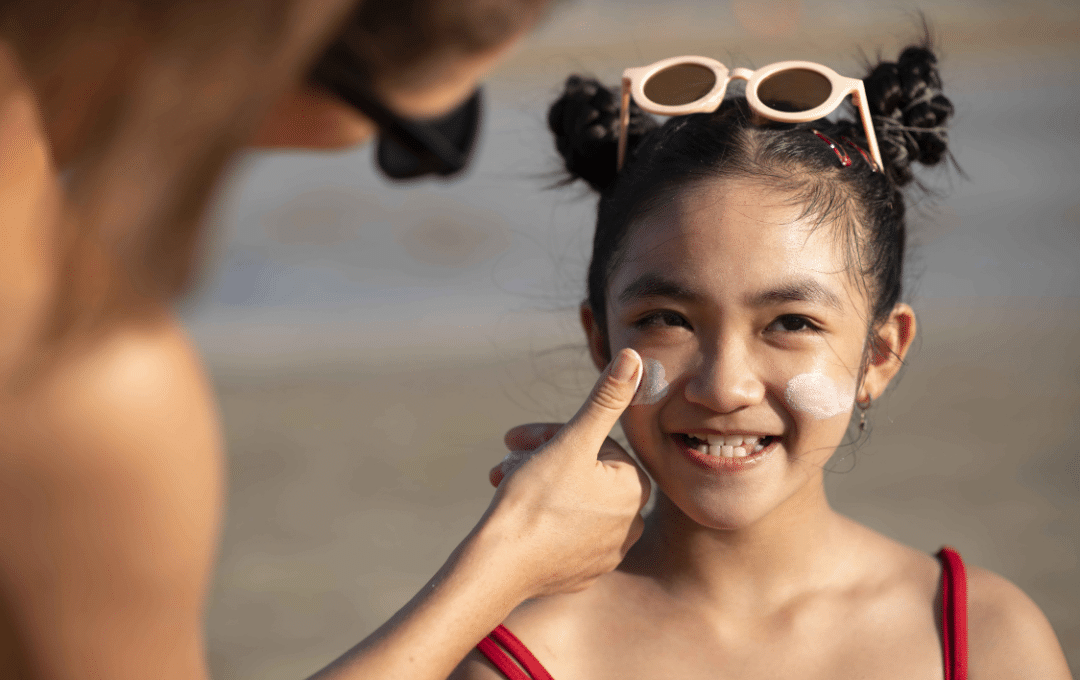A child struck down by heat exhaustion or heatstroke after some outdoor playtime is every parent’s nightmare. UNICEF reports that a third of the world’s children experience 4–5 heat waves per year on average. As the summer heat intensifies, this alarming statistic highlights the urgent need to protect our little ones from heatwave impacts.
Understanding these heatwave impacts and taking proactive measures can mean the difference between a fun summer scavenger hunt and a trip to the emergency room. Let’s explore why kids are more vulnerable to heat waves and take note of summer safety tips for parents from the best pediatricians in Fresno, CA.
Contact our pediatricians at Children’s Medical Centers of Fresno today for expert advice and support in keeping your children safe during heatwaves.
Keep Your Kids Cool and Safe!
Book an Appointment Today!
Understanding Heatwaves
Heatwaves are prolonged periods of extremely hot weather occurring when high-pressure systems trap warm air in a region. This weather pattern can lead to dangerous temperatures, posing severe health risks, especially for children. Kids are more vulnerable during heatwaves due to several physiological reasons.
Children’s bodies absorb heat faster and have a higher surface area-to-body mass ratio than adults, which means they heat up more quickly. Additionally, children sweat less than adults, making it harder to cool down through evaporation. Their bodies are still developing, so their temperature regulation systems aren’t as efficient.
In recent years, Fresno has seen record-breaking temperatures, making heat waves a significant concern. According to Scientific American, children are particularly susceptible to the heatwave impact due to their developing bodies and smaller size. This increased vulnerability underscores the need for heightened awareness and preparedness among parents.
Understanding and mitigating heatwave impacts is the first step to protecting your child. By staying informed and prepared, you can ensure that your children enjoy a safe and fun summer.
Health Risks for Children

Heat waves pose significant risks to children, leading to various heat-related illnesses. Recognizing the signs of heat-related illnesses empowers parents to take immediate, proactive steps to safeguard their children and avoid serious health risks.
-
Heat Exhaustion
Heat exhaustion occurs when a child’s body overheats and struggles to cool down. Symptoms include:
- Heavy sweating
- Weakness
- Dizziness
- Nausea
- Headaches
If your child comes inside flushed and dizzy after some playtime outdoors, this could be heat exhaustion. If untreated, it can escalate to heatstroke. Encourage your child to rest in a cool place, drink water, and stay out of the heat.
2.Heatstroke
Heatstroke is a severe medical emergency. When a child’s body temperature rises above 104°F, it can lead to:
- Seizures
- Loss of consciousness
When they look unusually lethargic, do not respond to their name, and have hot and dry skin, immediate action is vital. Call emergency services or our pediatricians at Children’s Medical Centers of Fresno. While waiting, cool your child down with wet clothes or a cool bath.
3. Dehydration
Children lose fluids rapidly, especially in high temperatures. Dehydration symptoms include:
- Dry mouth
- Lethargy
- Dark urine
Your child may become unusually tired or cranky and make fewer trips to the bathroom. Encourage regular water intake, even if your child doesn’t feel thirsty. Fun water bottles and setting hydration goals can help them look forward to drinking water and make it a good habit.
4. Long-Term Health Issues
Frequent exposure to high temperatures can cause lasting health issues, including:
- Heart Problems: Prolonged heat exposure can strain the heart, leading to cardiovascular issues.
- Lung Issues: Hot weather can exacerbate respiratory problems and lead to chronic lung conditions.
- Kidney Damage: Dehydration from heat can impair kidney function and lead to long-term damage.
- Neurological Effects: Heat stress can impact cognitive function and cause neurological disorders.
- Skin Conditions: Repeated heat exposure can cause skin damage, rashes and exacerbate conditions like eczema.
Staying informed about these potential health risks and taking preventive measures can help protect your child’s long-term health.
Signs to Watch For
Parents should stay vigilant for the following signs of heat-related illnesses in their children:
- Excessive Thirst: Drinking more water than usual
- Irritability: Unusual crankiness or mood swings
- Rapid Breathing: Faster than average breathing rate
- Dry Skin: Lack of sweating despite the heat
Consult with a pediatrician to receive personalized advice and care for your child. Remember, acting early is crucial in keeping your child safe from the dangers of heat waves.
Identifying At-Risk Groups
Certain groups of children face higher risks during heatwaves:
- Children with Pre-existing Conditions: Asthma, diabetes, and other chronic illnesses can worsen with heat exposure.
- Infants and Toddlers: Younger children cannot regulate their body temperature very well and communicate their discomfort.
Understanding which children are most vulnerable helps in taking the proper steps to protect them. Now, explore essential preventive measures and safety tips to keep your kids safe during heatwaves.
Preventive Measures and Safety Tips

Keeping your children safe from heatwave impacts involve proactive steps to minimize their exposure to extreme temperatures. These simple yet effective tips can significantly reduce the risk of heat-related illnesses and ensure your kids enjoy their summer safely.
Ensure children drink plenty of water throughout the day. Aim for at least 8–10 cups daily, adjusting for activity levels and temperature.
Use air conditioning and fans to keep living spaces cool. Encourage your children to play indoors when it’s hottest outside, usually between 10 AM and 4 PM.
-
Wear Appropriate Clothing and Sunscreen
Dress children in lightweight, loose-fitting clothing and apply broad-spectrum sunscreen with at least SPF 30.
-
Schedule Outdoor Activities
Plan outdoor playtime for early mornings or late afternoons when temperatures are more relaxed. Always provide shade and breaks to rest.
Despite your best efforts, emergencies can still occur. Knowing how to respond promptly and effectively can make all the difference. Let’s explore the critical steps to take if your child shows signs of a heat-related illness.
Emergency Response and Treatment
Even with the best preventive measures, emergencies can still happen. Recognizing the signs of heat-related illnesses early and knowing how to respond can be life-saving. Here’s what to do if your child shows symptoms of heat-related illness:
- Move to a Cooler Area: Get them indoors or into the shade.
- Hydrate: Give cool water or a sports drink.
- Cool Down: Use a damp cloth or fan to lower body temperature.
Seek immediate medical assistance from Fresno Medical Center if symptoms like confusion, vomiting, or unconsciousness occur. Quick intervention can prevent severe heatwave impacts.
Role of Pediatricians and Medical Centers
Pediatricians in Fresno, CA, are crucial in managing and preventing heat-related illnesses. They offer:
- Regular Check-Ups: Monitor your child’s health during summer.
- Personalized Advice: Tailored tips based on your child’s health history.
- Emergency Care: Immediate treatment for heat-related emergencies.
Children’s Medical Centers of Fresno provides comprehensive services to address all heatwave impacts, ensuring your child receives the best care possible.
Shade Your Child from the Summer Heat
Heatwaves pose significant health risks to children, but proactive measures can make a difference. Stay informed, prepared, and vigilant to ensure your child’s safety. Regular consultations with Fresno’s top pediatricians provide expert guidance and peace of mind.
Call us today at (559) 455-1500 or click the Book an Appointment button below for expert guidance on keeping your child safe during heatwaves. Take advantage of our flexible after-hours appointments, available from 5 PM to 9 PM Monday through Friday and 9 AM to 3 PM on Saturdays.
Trust our expert team to provide personalized care, either in-person or through telehealth services, ensuring your child stays relaxed and healthy all summer.
Beat the Heat with the Experts!
Book an Appointment





